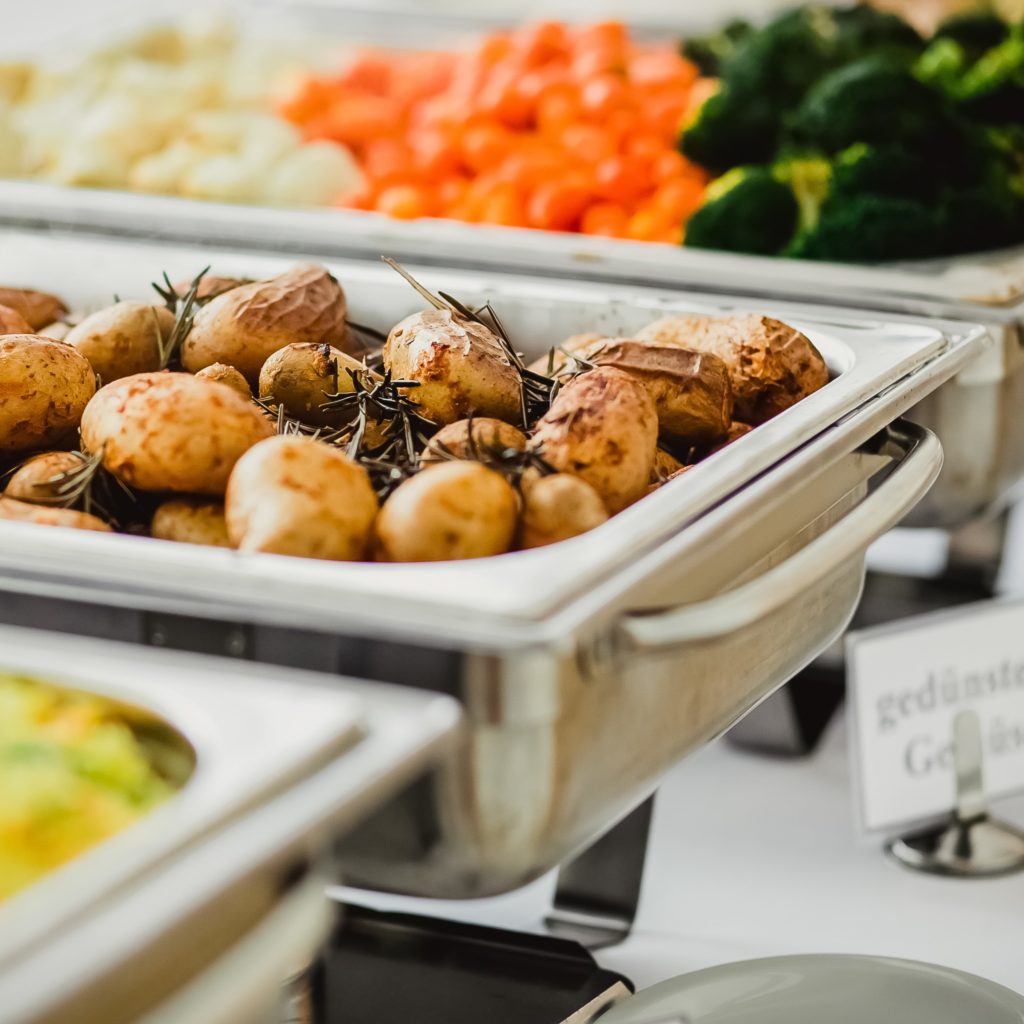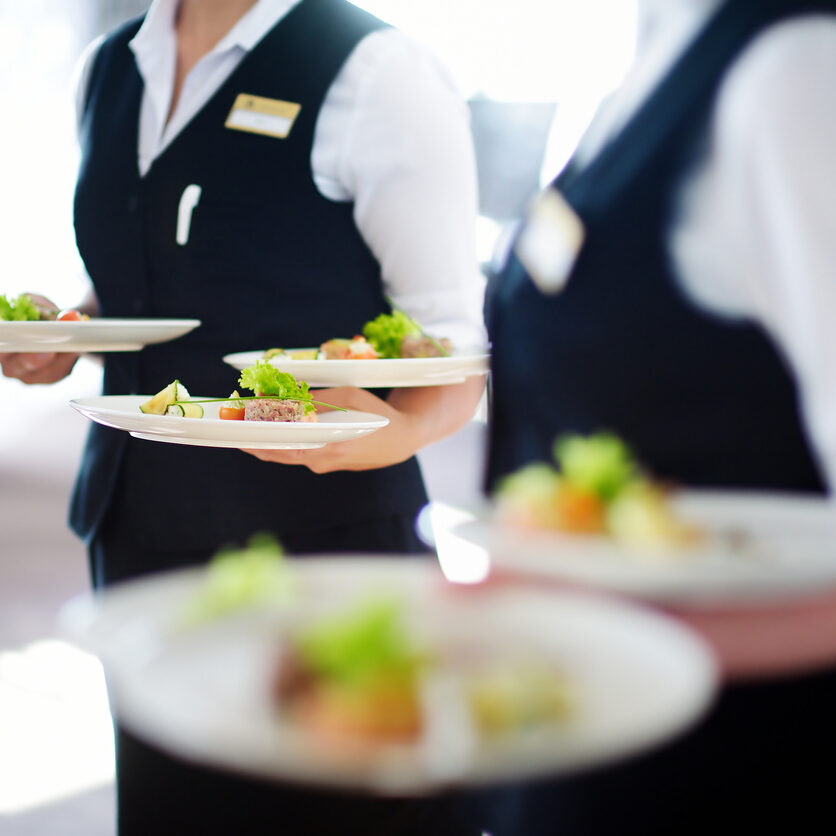Dining out poses unique challenges for those living with food allergy. Help ensure your event accommodates those with food allergy. Here you will find things to remember when you are catering an event, whether you are an event manager, chef, or server.
Event Managers
Planning a catered event often begins with meeting with an event manager. Have a plan for addressing and accommodating guests with food allergy. If you’re meeting with an event manager, be sure to share these tips with them.
Event Managers should:

- Require guests to inform them of their food allergies on the registration form
- Notify caterers of the name of the registered allergic guest and provide a list of their food allergies pre-event
- Work closely with the food and beverage manager or chef to develop menu option for allergic guests
Caterers
It is necessary for guests with food allergy to get the support they need to make informed decisions. Caterers can ensure a safe dining experience for guests with food allergy by following the key strategies and tips below.
Caterers should:

1. Develop or review your company’s anaphylaxis policy including:
- Allergen management work methods for all areas from menu planning, purchasing, preparing to serving of food
- A master ingredient information list highlighting priority allergens and other foods that are frequently a concern to guests
- Work closely with suppliers
- Do not substitute ingredients
- Keep master ingredient list fresh and accurate
- Avoid using products that indicate that they “may contain” the guest’s allergen when preparing their food
- Cross-contamination prevention including:
- Keep preparation surfaces clean
- Use clean pans, cutting boards and cooking utensils or use dedicated or colour coded preparation areas, equipment, utensils etc. when possible
- Use clean or dedicated fryers, grills and slicers
- Use clean serving trays and serving utensils
- Keep non-allergens from touching allergens
- Avoid allergen spilling or leaking into non-allergen ingredients
- Schedule prepping and cooking non-allergens first following regular cleaning and sanitizing
- Cross-contamination can happen when a small amount of a food allergen gets into another food accidentally. Check out our avoiding cross-contamination page.

2. Develop a communication plan:
- Develop a written communication plan internally and externally
- Communicate the plan to all staff
- Inform all staff of there roles and responsibilities both back of house (BOH) and front of house (FOH)
- Chef or manager responds directly to event managers or guests
- Inform all staff of the allergic guest’s special order and the need for vigilance and discretion
- Advise staff about menu options and ingredient information
- Advise staff of changes in suppliers or substitutions
- Utilize various communication tools such as, allergen charts, recipe files, product labels, menu lists, ingredient lists, apps or online ingredient information
- Assign a BOH staff to prepare the selected plated meal
- Circulate a list of attendees and their food allergies to all staff well in advance of the event
- Provide signage or allergen policy information on web sites
- On-line pre-ordering of food to include area to indicate food allergy requests
- Communication to event manager and guest:
- Chef or manger to speak directly to the allergic event manager and guest prior to the event or at the event to review the menu selection and discuss any further concerns
- Encourage allergic guests to notify event manager prior to attending an event or dining at a catered event
- Encourage plated meal option rather than selecting from a buffet, cover and include guest’s name along with a full list of ingredients
- Emergency response including protocol and training key employees to assist in the use of auto-injectors
- Keep Anaphylaxis Emergency Plans accessible
- Know where auto injectors are kept and how to use them in case of an emergency
3. Have buffet options:

- Have all allergen related inquiries directed to chef of manager
- Place ingredient information signs beside each buffet option indicating highlighted allergens
- Arrange serving platters that allow for separation from priority allergens from other foods
- Keep allergen safe foods together (e.g. plain vegetables on one end of salad bar, croutons and dressing at the opposite end)
- Use pre-packaged condiments and dressing or keep condiment containers covered and separated to avoid spillage between them
- Avoid areas that spilling and dripping of one food to another can occur
- Use signage to inform guests not to contaminate serving utensils and remove and replace contaminated utensils immediately
- Invite allergic guest to be served first in buffet line
Servers
It is important that servers are aware of food allergy and follow the appropriate steps when serving guests with food allergy. Find out what servers should keep in mind and how to be allergy-aware.
Servers should:

- Have an understanding of the seriousness of food allergy
- Respect the needs of allergic customers/guests
- Ask about food allergies as part of the ordering process
- Direct all allergen inquiries to the Chef or Manager
- Be respectful of the anaphylaxis policies implemented in the facility
- Use dedicated utensils and trays when serving food
- Ensure the correct guest receives the correct meal
- Avoid serving allergen and non allergen Hors d’oeuvres on same tray
- Practice good hygiene (i.e. hand washing)
- Clean up eating areas thoroughly before and after food is served
- Follow emergency plans if required
Tips for allergic guests
Are you the allergic guest? Follow these steps before heading to a catered event.
- Notify event managers or caterer in advance of the event and present written allergen information pre-event or at event to assist with communication
- Avoid ordering or selecting a food, if in doubt
- Carry epinephrine auto-injector at all times
- Select caterers who have allergen management procedures and training programs in place
- Communicate allergies to management upon arrival
- Communicate allergies to those who you are dining with
- Discuss safe options with the manager or chef
- Avoid all pre-package food ingredients that indicate that they “may contain” your allergen
- Wear MedicAlert jewelry
- Inform catering staff immediately if a reaction occurs and follow the 5 emergency steps
- Stay calm and ask for assistance
- Read about other adults’ experiences and tips while attending or organizing weddings.
- Destination weddings with food allergies
- Planning a wedding with food allergies

